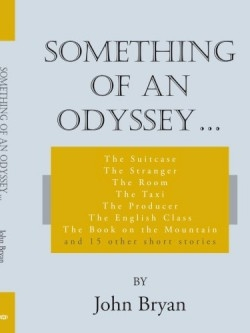Something of an Odyssey
I thought I was in a prison, but the prison was just myself. We are all caught in ourselves. —Camus, from The Stranger
The unconscious mind every so often hands a writer an intact narrative, like Mary Shelley’s Frankenstein or Robert Louis Stevenson’s Doctor Jekyll and Mister Hyde. The twenty-two stories of Something of an Odyssey are billed as immediate transcriptions, close in presentation to Jack Kerouac’s Book of Dreams.
Layouts follows vertical poetic forms, although a few use prose paragraphs. Dream rules are operative; a peculiar physics and rationality governs the possibilities. Uniting themes are imprisonment and persecution, the familiar and the foreign. Even when the Dreamer is more observer than victim, he consistently identifies with the oppressed, with defendants. Tantalizing opportunities to uncover mystical knowledge are barely beyond the Dreamer’s reach. Struggles to bridge that gap compromise safety, as situations are controlled by neutral or malevolent forces whose intentions are not spelled out. “I do not know what is expected of me, / I do not know what I expect of myself.”
A captivating story, The Producer, is set in a musical theater. It pivots on audience participation. The character called the High Troubadour induces a hypnotic atmosphere of mass suggestibility by endlessly recycling a song of three syllables. As planned, the crowd surges forward and is given pastries baked with love, from an inexhaustible supply—think loaves and fishes. The gratitude of the receivers and the givers is immense. A spirit of community and bliss prevails (i.e. Grateful Dead concerts), until inevitably, the dream shifts and the gratitude curdles into rejection.
Buried deep in the closing mini-epic, The Book of the Mountain, is a potentially nullifying disclaimer, “Maybe my story is a dream.” Maybe?! If these are simulations of dreams, then the numerous drop-off endings and the high gradient of amorphous confusion aren’t excusable as “received” documentation. Other problems include the superfluous tag “Another Short Story by…” beneath story titles, and front matter includes a preface, two introductions and an extended About the Author section. Despite the strangeness of dream-logic, this amounts to too much clarifying. Readers should skip to the opening story, The Suitcase, and develop their own ideas.
John Bryan organized international piano competitions, managed and produced opera companies in Europe and the States, stood trial for resisting the military draft, and worked as the Assistant Undersecretary for Humanitarian and Social Affairs for the United Nations. The latter career experience seems key to the sense of free-floating guilt the Dreamer can’t shake. The Convention Center addresses it most directly: “These refugees…were begging for food and mercy and I should have paid more attention.”
Ten readers may draw ten different conclusions regarding the interpretation of the dreams’ content, but substantial allegorical symbolism and surprising narrative shifts will assure that no one will put Something of an Odyssey down for reasons of boredom.
Disclosure: This article is not an endorsement, but a review. The publisher of this book provided free copies of the book and paid a small fee to have their book reviewed by a professional reviewer. Foreword Reviews and Clarion Reviews make no guarantee that the publisher will receive a positive review. Foreword Magazine, Inc. is disclosing this in accordance with the Federal Trade Commission’s 16 CFR, Part 255.

